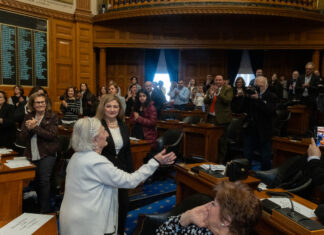By Lisa Manookian
Special to the Mirror-Spectator

PHILADELPHIA — On Sunday, April 11, members of the Philadelphia-Armenian community gathered at St. Sahag & St. Mesrob Armenian Church to meet a pioneer and visionary whose company has become a symbol of corporate excellence in Armenia. Ralph Yirikian is the general manager of VivaCell-MTS, a 2005 startup which in the past five years has become Armenia’s leading mobile operator and top taxpayer. Through innovation, VivaCell-MTS has enhanced options and products for its customers, while spearheading initiatives that have made it an exemplary company of Corporate Social Responsibility in Armenia. As a result, VivaCell-MTS has channeled several million dollars into healthcare, cultural, environmental, educational and infrastructure projects throughout Armenia in a sustainable leading manner.
The Sunday afternoon program was sponsored by Birthright Armenia and hosted by the St. Sahag and St. Mesrob parish. While introducing Yirikian, the executive director of Birthright Armenia, Linda Yepoyan, stated that Yirikian has “raised the bar of corporate social responsibility” in Armenia. Yirikian addressed the crowd by initially affirming that his intention to visit Armenian communities throughout the United States was neither predicated on promoting his company’s products and services, nor for the purpose of fundraising. Rather, his mission was to share a story of how one company has made a difference in our Hayrenik (“our fatherland”).

VivaCell-MTS was established on the solid foundations of several ideals: to bring technological innovation and wireless communications to the people of Armenia; to provide vast mobile network coverage throughout the country via the latest technologies; to hire smart and savvy Armenians in order to help grow the company and contribute to Armenia’s economy and to promote corporate social responsibility. The VivaCell-MTS family is currently 1,200 strong and growing, with an average age of 32, and fairly evenly split in terms of the male/female ratio. Granted a license to operate in Armenia in November 2004, VivaCell-MTS became the second telecom operator in Armenia. Prior to VivaCell-MTS’ entry into the Armenian telecom arena, Armenia’s first mobile network operator, ArmenTel, had held a monopoly of the telecommunications sector since independence in 1991. In February 2005, VivaCell-MTS was awarded a supply agreement for a 400,000 subscriber capacity network. Commercially launched in July 2005, VivaCell-MTS expanded its subscriber capacity to 800,000 by December 2005, thus crossing the threshold of 50-percent market share within its first six months of operations. By November 2006, it had reached a capacity of 1.5 million subscribers. With a vastly superior network vis-à-vis its nearest competitor, VivaCell-MTS presently has more than 2.1 million subscribers and a market share of 81 percent. It has customers in Armenia, Artsakh, Russia, Ukraine and Uzbekistan, among others, and its experience in both eastern and western markets has helped it surpass its competition in Armenia, which currently includes ArmenTel and the French telecom operator Orange.
The company’s commitment to corporate responsibility extends externally to the environment and to society, in general, through various investments in socio-economic and philanthropic projects. Yirikian and his team were able to convince VivaCell-MTS’ Russian and Lebanese shareholders to believe in the importance of giving back to society. For VivaCell-MTS, corporate social responsibility involves returning a fraction of its earnings to society by investing sweat equity into projects that benefit those less fortunate in society. According to Yirikian, simply hosting banquets and making toasts to congratulate the efforts of a few are not proactive.
Yirikian reminded those in attendance that “as well as we maintain our homes, we must also maintain the greater community in which we live.”









